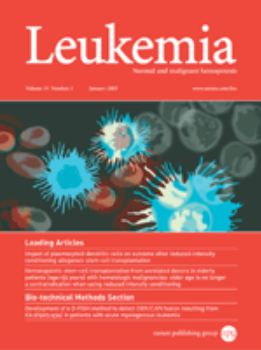分子谱分析对于指导MEK抑制剂在Erdheim-Chester病中的应用至关重要
IF 13.4
1区 医学
Q1 HEMATOLOGY
引用次数: 0
摘要
我们非常感谢Pegoraro等人参与我们的研究,评估MAPK-ERK通路改变对MEK抑制剂(MEKi)治疗Erdheim-Chester病(ECD)疗效的影响。他们的真实世界队列提供了关于MEKi在更广泛的患者群体中的疗效的有价值的额外数据。然而,我们强调了他们的发现和我们的发现之间的几个关键区别。首先,Pegoraro等人报道的“野生型”(WT)队列似乎不包括在MAPK-ERK途径之外携带致病变异的患者,如CSF1R突变或耐药BRAF和MEK突变,这些突变是已知的ECD驱动因素[2,3,4]。相比之下,在我们的研究中,所有对MEKi没有反应的患者都携带非mapk - erk突变或II类BRAF变体。重要的是,这些患者随后对改变特异性靶向治疗(例如,培西达替尼治疗CSF1R突变)产生了反应。因此,替代致癌驱动因素的存在——而不是MAPK-ERK变体的缺失——似乎是MEKi耐药的基础。法国-意大利WT亚队列缺乏关于所使用的下一代测序(NGS)面板的灵敏度和深度的详细信息。此外,他们的研究报告了20%的MAPK-ERK野生型病例率——远远高于其他当代ECD队列的报告[5,6]——可能表明未能检测到低负担致病性MAPK-ERK途径突变,而不是真正缺乏低负担致病性MAPK-ERK途径突变,或者是对使用MEKi治疗的阴性NGS患者的选择偏倚。至关重要的是,作者没有报告任何已知的非mapk - erk驱动改变的患者对MEKi有反应的病例。因此,在没有详细的分子分析的情况下,很难明确地得出MEKi功效与MAPK-ERK通路突变无关的结论。本文章由计算机程序翻译,如有差异,请以英文原文为准。


Molecular profiling is critical to guide MEK inhibitor use in Erdheim-Chester disease
求助全文
通过发布文献求助,成功后即可免费获取论文全文。
去求助
来源期刊

Leukemia
医学-血液学
CiteScore
18.10
自引率
3.50%
发文量
270
审稿时长
3-6 weeks
期刊介绍:
Title: Leukemia
Journal Overview:
Publishes high-quality, peer-reviewed research
Covers all aspects of research and treatment of leukemia and allied diseases
Includes studies of normal hemopoiesis due to comparative relevance
Topics of Interest:
Oncogenes
Growth factors
Stem cells
Leukemia genomics
Cell cycle
Signal transduction
Molecular targets for therapy
And more
Content Types:
Original research articles
Reviews
Letters
Correspondence
Comments elaborating on significant advances and covering topical issues
 求助内容:
求助内容: 应助结果提醒方式:
应助结果提醒方式:


